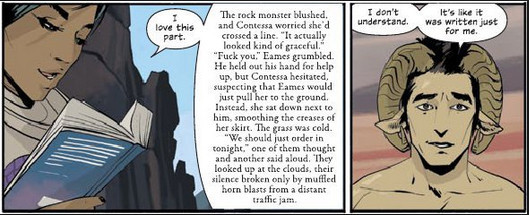
They are on opposite sides of a war that has been going on for practically forever. He has horns and magic spells, she has wings and a quick temper. They fall in love, and what's refreshing and fun, don't waste time on pining and wondering if it's possible. They just accept it and try to make the best of a difficult situation.
I heard so much gushing about Saga that it got annoying and I thought I'm probably not going to like it, but here I am, liking it a lot. Yeaah and a tiny littel fictional crush on Marko, he has the most gorgeous expressive eyebrows and just can't help adoring a characer who has come to his own moral conclusions and feels compelled to follow through even if it should get him killed. Which it doesn't but the intent was there. But Alana is also great, not your typical supercool kickass fighter dream girl but an actual interesting person. And she reads romance literature – at least one book – obsessively. Oh Oswald Heist, how I wish I could buy your lovely book A Night Time Smoke from Amazon!
Alana understanding that the eternal war is not the only possible mode of existence is the sort of revelation I'm hoping for when reading through various cheesy romance novels – exaggerated for dramatic effect, naturally, but still. Love and mating are such fundamental parts of human existence, that they deserve to be investigated thoroughly. What is this 'love' thing anyway? Between which people it can happen? What causes it and why? What threatens it, where does it thrive? How much can and should be sacrificed for it? Generally commercial romances offer the reader exactly what she wants to read, they do not exist to broaden views of challenge the reader's norms, but nonetheless they are a sort of research into this very important phenomenon.
And then there's Hazel, their baby. And there are also in-laws, and more relatives appear as the story progresses. This is where it gets really interesting. Usually "family" and "adventure" don't go together in fiction. For the actual story to begin, the protagonist has to be separated from family in some way. Getting lost or enrolling in a magical school if it's fiction for kids (OK this makes the most sense), family being kidnapped or staying at home waiting for daddy to save the world for family audiences, and family getting brutally killed in case of grown-up men-oriented fiction. Only after losing one's family the hero can go on a violent revenge rampage. I can't think of any hardcore shoot'em'all action movie where the hero has a family to return to. (But admittedly I haven't done extensive research.)
I would like to draw some conclusions about this in regards to gender roles, but I can't compose any argument when also in fairytales for girls the adventure ends about 2 minutes after the love interest prince is introduced and new nuclear family is formed... story done, now close your eyes and fall asleep, the fun is over. The general message is that family is where story ends and begins, but the actual adventure, the story, exciting and interesting and worth telling is just plain impossible if the family is present.
But Saga takes a different approach. Family is part of the story, family is how the story unfolds, family actually *is* the story, without it there would be just the status quo of eternally warring factions.
And there are wooden rockets and ghost nannies and spider assasins and various fascinating locales. Also, all the side characters are full personalities, of which the reader would like to know more of. And the art is good, uncomplicated and clean but never boring and always expressive. First four albums done, I'm delighting in the pile of unread Saga adventures waiting for me and actually congratulating myself on gettng started so late, letting the story accumulate, I don't need to wait for months for the story to continue...
Kommentit
Tämän blogin kommentit tarkistetaan ennen julkaisua.